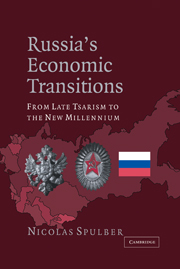Book contents
- Frontmatter
- Contents
- Figures and Tables
- Preface
- PART I THE TSARIST ECONOMIC TRANSITION
- PART II THE SOVIET ECONOMIC TRANSITION
- 10 The Socioeconomic Framework
- 11 The Transition Issues
- 12 The Economic Policies
- 13 The Problems of Agriculture
- 14 The Industrial Changes
- 15 Domestic and Foreign Trade
- 16 Money and Banking
- 17 State Finance
- 18 Overall View
- PART III THE POST-SOVIET ECONOMIC TRANSITION
- Index
17 - State Finance
Published online by Cambridge University Press: 03 December 2009
- Frontmatter
- Contents
- Figures and Tables
- Preface
- PART I THE TSARIST ECONOMIC TRANSITION
- PART II THE SOVIET ECONOMIC TRANSITION
- 10 The Socioeconomic Framework
- 11 The Transition Issues
- 12 The Economic Policies
- 13 The Problems of Agriculture
- 14 The Industrial Changes
- 15 Domestic and Foreign Trade
- 16 Money and Banking
- 17 State Finance
- 18 Overall View
- PART III THE POST-SOVIET ECONOMIC TRANSITION
- Index
Summary
Size and Structure of Budget
The state budget constituted the center of the Soviet financial system and Soviet financial planning. It disposed of different resources than those of the government budgets in market-directed economies and spent these resources for different purposes. It was an instrument of the state as owner and manager of the economy, an instrument for coordinating the material and financial plans, correlating the centralized and decentralized funds, controlling the activities of enterprises and associations, and channeling a large part of the state's resources and of various kinds of subsidies toward the selected branches of the economy.
The budget system was hierarchically consolidated. The USSR state budget (Gosudarstvennyi biudzhet SSSR) included the Union budget (Soiuznyi biudzhet) as well as the budgets of each of the fifteen union republics (Gosudarstvennyi biudzhet soiuznoi respubliki). The latter, in turn, included the republic budgetitself as well as the budgets of the autonomous republics and the local budgets (mestnyie biudzhety). In keeping with the principle of all-union centralization, only the budget of the USSR had the right to levy taxes, whether all-union, republic, or local; the budgets of the lower level had the right to their “own” revenues, but these were designated from above. In the system that prevailed until the late 1980s, there were no clear-cut indications as to which specific budget collected which revenue and which specific expenditures were made by each budget. Data on the structure of budget revenues and expenditures indicated only the total distribution by levels.
- Type
- Chapter
- Information
- Russia's Economic TransitionsFrom Late Tsarism to the New Millennium, pp. 259 - 270Publisher: Cambridge University PressPrint publication year: 2003



